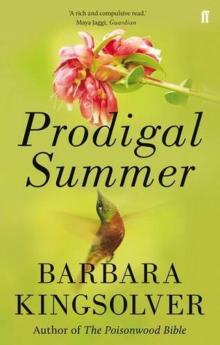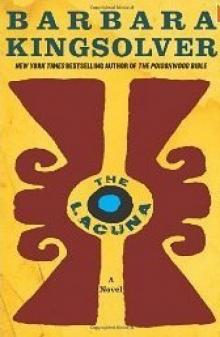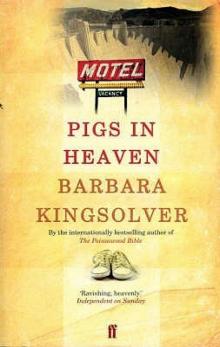- Home
- Barbara Kingsolver
Prodigal Summer
Prodigal Summer Read online
Barbara Kingsolver
{ A Novel }
Prodigal Summer
—for Steven, Camille, and Lily,
and for wildness, where it lives
Prothalamium
Come, all you who are not satisfied as ruler in a lone, wallpapered room full of mute birds, and flowers that falsely bloom, and closets choked with dreams that long ago died!
Come, let us sweep the old streets—like a bride: sweep out dead leaves with a relentless broom; prepare for Spring, as though he were our groom for whose light footstep eagerly we bide.
We’ll sweep out shadows, where the rats long fed; sweep out our shame—and in its place we’ll make a bower for love, a splendid marriage-bed fragrant with flowers aquiver for the Spring. And when he comes, our murdered dreams shall wake; and when he comes, all the mute birds shall sing.
—Aaron Kramer
Contents
Epigraph
1
Predators
2
Moth Love
3
Old Chestnuts
4
Predators
5
Moth Love
6
Old Chestnuts
7
Predators
8
Moth Love
9
Old Chestnuts
10
Moth Love
11
Predators
12
Old Chestnuts
13
Predators
14
Old Chestnuts
15
Moth Love
16
Predators
17
Old Chestnuts
18
Moth Love
19
Predators
20
Old Chestnuts
21
Moth Love
22
Predators
23
Old Chestnuts
24
Moth Love
25
Predators
26
Old Chestnuts
27
Moth Love
28
Old Chestnuts
29
Predators
30
Moth Love
31
She paused at the top of the field, inhaling the…
Acknowledgements
About the Author
Other Books by Barbara Kingsolver
Copyright
About the Publisher
{1}
Predators
Her body moved with the frankness that comes from solitary habits. But solitude is only a human presumption. Every quiet step is thunder to beetle life underfoot; every choice is a world made new for the chosen. All secrets are witnessed.
If someone in this forest had been watching her—a man with a gun, for instance, hiding inside a copse of leafy beech trees—he would have noticed how quickly she moved up the path and how direly she scowled at the ground ahead of her feet. He would have judged her an angry woman on the trail of something hateful.
He would have been wrong. She was frustrated, it’s true, to be following tracks in the mud she couldn’t identify. She was used to being sure. But if she’d troubled to inspect her own mind on this humid, sunlit morning, she would have declared herself happy. She loved the air after a hard rain, and the way a forest of dripping leaves fills itself with a sibilant percussion that empties your head of words. Her body was free to follow its own rules: a long-legged gait too fast for companionship, unself-conscious squats in the path where she needed to touch broken foliage, a braid of hair nearly as thick as her forearm falling over her shoulder to sweep the ground whenever she bent down. Her limbs rejoiced to be outdoors again, out of her tiny cabin whose log walls had grown furry and overbearing during the long spring rains. The frown was pure concentration, nothing more. Two years alone had given her a blind person’s indifference to the look on her own face.
All morning the animal trail had led her uphill, ascending the mountain, skirting a rhododendron slick, and now climbing into an old-growth forest whose steepness had spared it from ever being logged. But even here, where a good oak-hickory canopy sheltered the ridge top, last night’s rain had pounded through hard enough to obscure the tracks. She knew the animal’s size from the path it had left through the glossy undergrowth of mayapples, and that was enough to speed up her heart. It could be what she’d been looking for these two years and more. This lifetime. But to know for sure she needed details, especially the faint claw mark beyond the toe pad that distinguishes canid from feline. That would be the first thing to vanish in a hard rain, so it wasn’t going to appear to her now, however hard she looked. Now it would take more than tracks, and on this sweet, damp morning at the beginning of the world, that was fine with her. She could be a patient tracker. Eventually the animal would give itself away with a mound of scat (which might have dissolved in the rain, too) or something else, some sign particular to its species. A bear will leave claw marks on trees and even bite the bark sometimes, though this was no bear. It was the size of a German shepherd, but no house pet, either. The dog that had laid this trail, if dog it was, would have to be a wild and hungry one to be out in such a rain.
She found a spot where it had circled a chestnut stump, probably for scent marking. She studied the stump: an old giant, raggedly rotting its way backward into the ground since its death by ax or blight. Toadstools dotted the humus at its base, tiny ones, brilliant orange, with delicately ridged caps like open parasols. The downpour would have obliterated such fragile things; these must have popped up in the few hours since the rain stopped—after the animal was here, then. Inspired by its ammonia. She studied the ground for a long time, unconscious of the elegant length of her nose and chin in profile, unaware of her left hand moving near her face to disperse a cloud of gnats and push stray hair out of her eyes. She squatted, steadied herself by placing her fingertips in the moss at the foot of the stump, and pressed her face to the musky old wood. Inhaled.
“Cat,” she said softly, to nobody. Not what she’d hoped for, but a good surprise to find evidence of a territorial bobcat on this ridge. The mix of forests and wetlands in these mountains could be excellent core habitat for cats, but she knew they mostly kept to the limestone river cliffs along the Virginia-Kentucky border. And yet here one was. It explained the cries she’d heard two nights ago, icy shrieks in the rain, like a woman’s screaming. She’d been sure it was a bobcat but still lost sleep over it. No human could fail to be moved by such human-sounding anguish. Remembering it now gave her a shiver as she balanced her weight on her toes and pushed herself back upright to her feet.
And there he stood, looking straight at her. He was dressed in boots and camouflage and carried a pack larger than hers. His rifle was no joke—a thirty-thirty, it looked like. Surprise must have stormed all over her face before she thought to arrange it for human inspection. It happened, that she ran into hunters up here. But she always saw them first. This one had stolen her advantage—he’d seen inside her.
“Eddie Bondo,” is what he’d said, touching his hat brim, though it took her a moment to work this out.
“What?”
“That’s my name.”
“Good Lord,” she said, able to breathe out finally. “I didn’t ask your name.”
“You needed to know it, though.”
Cocky, she thought. Or cocked, rather. Like a rifle, ready to go off. “What would I need your name for? You fixing to give me a story I’ll want to tell later?” she asked quietly. It was a tactic learned from her father, and the way of mountain people in general—to be quiet when most agitated.
“That I can’t say. But I won’t bite.” He grinned—apologetically, it seemed. He was very much younger than she. His left hand reached up to his shoulder, fingertips just brushing the barrel of the rifle strapped to his shoulder. “And I don’t shoot girls.”
“Well. Wonderful news.”
Bite, he’d said, with the northerner’s clipped i. An outsider, intruding on this place like kudzu vines. He was not very tall but deeply muscular in the way that shows up through a man’s clothing, in his wrists and neck and posture: a build so accustomed to work that it seems tensed even when at ease. He said, “You sniff stumps, I see.”
“I do.”
“You got a good reason for that?”
“Yep.”
“You going to tell me what it is?”
“Nope.”
Another pause. She watched his hands, but what pulled on her was the dark green glint of his eyes. He observed her acutely, seeming to evaluate her hill-inflected vowels for the secrets behind her “yep” and “nope.” His grin turned down on the corners instead of up, asking a curved parenthetical question above his right-angled chin. She could not remember a more compelling combination of features on any man she’d ever seen.
“You’re not much of a talker,” he said. “Most girls I know, they’ll yap half the day about something they haven’t done yet and might not get around to.”
“Well, then. I’m not most girls you know.”
She wondered if she was antagonizing him. She didn’t have a gun, and he did, though he’d promised not to shoot. Or bite, for that matter. They stood without speaking. She measured the silence by the cloud that crossed the sun, and by the two full wood-thrush songs that rang suddenly through the leaves and hung in the air between herself and this man, her—prey? No, her trespasser. Predator was a strong presumption.
“All right if I just follow you for a while?” he asked politely.
“No,” she snapped. “That wouldn’t suit me.”
Man or boy, what was he? His grin dissolved, and he seemed suddenly wounded by her curtness, like a scolded son. She wondered about the proper tone, how to do that. She knew how to run off a hunter who’d forgotten when deer season ended—that was her job. But usually by this point in the conversation, it was over. And manners had not been her long suit to begin with, even a lifetime ago when she lived in a brick house, neatly pressed between a husband and neighbors. She pushed four fingers into her hair, the long brown bolt of it threaded with silver, and ran them backward from her hairline to tuck the unraveled threads back into the braid at her nape.
“I’m tracking,” she said quietly. “Two people make more than double the noise of one. If you’re a hunter I expect you’d know that already.”
“I don’t see your gun.”
“I don’t believe I’m carrying one. I believe we’re on National Forest land, inside of a game-protection area where there’s no hunting.”
“Well, then,” said Eddie Bondo. “That would explain it.”
“Yes, it would.”
He stood his ground, looking her up and down for the longest while. Long enough for her to understand suddenly that Eddie Bondo—man, not child—had taken off all her layers and put them back on again in the right order. The dark-green nylon and Gore-Tex were regulation Forest Service, the cotton flannel was hers, likewise the silk thermal long johns, and what a man might find of interest underneath all that she had no idea. No one had been there in quite a while.
Then he was gone. Birdsong clattered in the space between trees, hollow air that seemed vast now and suddenly empty. He had ducked headfirst into the rhododendrons, leaving behind no reason to think he’d ever been there at all.
A hot blush was what he left her, burning on the skin of her neck.
She went to bed with Eddie Bondo all over her mind and got up with a government-issue pistol tucked in her belt. The pistol was something she was supposed to carry for bear, for self-defense, and she told herself that was half right.
For two days she saw him everywhere—ahead of her on the path at dusk; in her cabin with the moonlit window behind him. In dreams. On the first evening she tried to distract or deceive her mind with books, and on the second she carefully bathed with her teakettle and cloth and the soap she normally eschewed because it assaulted the noses of deer and other animals with the only human smell they knew, that of hunters—the scent of a predator. Both nights she awoke in a sweat, disturbed by the fierce, muffled sounds of bats mating in the shadows under her porch eaves, aggressive copulations that seemed to be collisions of strangers.
And now, here, in the flesh in broad daylight beside this chestnut stump. For when he showed up again, it was in the same spot. This time he carried his pack but no rifle. Her pistol was inside her jacket, loaded, with the safety on.
Once again she’d been squatting by the stump looking for sign, very sure this time that she was on the trail of what she wanted. No question, these tracks were canine: the female, probably, whose den she’d located fourteen days ago. Male or female, it had paused by this stump to notice the bobcat’s mark, which might have intrigued or offended or maybe meant nothing at all to it. Hard for a human ever to know that mind.
And once again—as if her rising up from that stump had conjured Eddie Bondo, as if he had derived from the rush of blood from her head—he stood smiling at her.
“There you are,” he said. “Not most girls I know.”
Her heart beat hard enough to dim her hearing in pulses.
“I’m the only one you know, looks like, if you’d be hanging around the Zebulon National Forest. Which you seem to be.”
He was hatless this time, black-haired and just a little shaggy like a crow in the misty rain. His hair had the thick, glossy texture she envied slightly, for it was perfectly straight and easy and never would tangle. He spread his hands. “Look, ranger lady. No gun. Behold a decent man abiding by the law.”
“So I see.”
“More than I can say for you,” he added. “Sniffing stumps.”
“No, I couldn’t lay any claim on being decent. Or a man.”
His grin grew a shade darker. “That I can see.”
I have a gun. He can’t hurt me, but she knew as she thought these words that some other tables had turned. He’d come back. She had willed him back to this spot. And she would wait him out this time. He didn’t speak for a minute or more. Then gave in. “I’m sorry,” he said.
“For what?”
“For pestering you. But I’m determined to follow you up this trail today, for just a little while. If you don’t mind.”
“What is it you’re so determined to find out?”
“What a nice girl like you is sniffing for in this big old woods. It’s been keeping me up nights.”
He’d thought of her, then. At night.
“I’m not Little Red Riding Hood, if that’s what’s worrying you. I’m twice as old as you are.” Twiced as old, she’d said, a long-extinguished hillbilly habit tunneling into her unpracticed talk.
“I doubt that sincerely,” he said.
She waited for more, and he offered this: “I’ll keep a little distance, if you like.”
What she didn’t like was the idea of his being behind her. “My preference would be for you to walk on ahead, and please take care not to step on the trail of this animal I’m tracking. If you can see to keep off of it.” She pointed to the three-day-old cat tracks, not the fresher trail in the leaf mold on the down side of the trail.
“Yes ma’am, I believe I can do that.” He bowed slightly, turned, and walked ahead, his feet keeping an expert’s distance from the tracks and hardly turning the leaf mold, either. He was good. She let him almost disappear into the foliage ahead, then she took up the trail of the two males walking side by side, cat and man. She wanted to watch him walk, to watch his body without his knowing it.
It was late afternoon, already something close to dark on the north side of the mountain, where rhododendrons hudd
led in the cleft of every hollow. In their dense shade the ground was bare and slick. A month from now the rhododendrons would be covered with their big spheres of pink blossoms like bridesmaids’ bouquets, almost too show-off fancy for a wildwood flower on this lonely mountain. But for now their buds still slept. Now it was only the damp earth that blossomed in fits and throes: trout lilies, spring beauties, all the understory wildflowers that had to hurry through a whole life cycle between May’s first warmth—while sunlight still reached through the bare limbs—and the shaded darkness of a June forest floor. Way down around the foot of this mountain in the valley farmland, springtime would already be winding down by the first week of May, but the tide of wildflowers that swept up the mountainsides had only just arrived up here at four thousand feet. On this path the hopeful flower heads were so thick they got crushed underfoot. In a few more weeks the trees would finish leafing out here, the canopy would close, and this bloom would pass on. Spring would move higher up to awaken the bears and finally go out like a flame, absorbed into the dark spruce forest on the scalp of Zebulon Mountain. But here and now, spring heaved in its randy moment. Everywhere you looked, something was fighting for time, for light, the kiss of pollen, a connection of sperm and egg and another chance.
He paused twice on the trail ahead of her, once beside a flame azalea so covered with flowers it resembled a burning bush, and once for no reason she could see. But he never turned around. He must be listening for her step, she thought. At least that, or maybe not. It really didn’t matter.
They reached the point where the old bobcat trail went straight up the slope, and she let him go. She waited until he was out of sight, and then turned downhill instead, stepping sideways down the steep slope until her feet found familiar purchase on one of the Forest Service trails. She maintained miles of these trails, a hundred or more over the course of months, but this one never got overgrown because it ran between her cabin and an overlook she loved. The fresher tracks had diverged from the bobcat trail and here they were again, leading exactly where she thought they’d go: downhill, in the direction of her recent discovery. Today she would bypass that trail. She’d already forced herself to stay away for two weeks—fourteen long days, counted like seasons or years. This was the eighth of May, the day she’d meant to allow herself to go back there, sneaking up on her secret to convince herself it was real. But now, no; of course not now. She would let Eddie Bondo catch up to her somewhere else, if he was looking.

 Prodigal Summer: A Novel
Prodigal Summer: A Novel Animal Dreams: A Novel
Animal Dreams: A Novel The Poisonwood Bible
The Poisonwood Bible High Tide in Tucson
High Tide in Tucson The Lacuna
The Lacuna The Bean Trees
The Bean Trees Animal, Vegetable, Miracle: A Year of Food Life
Animal, Vegetable, Miracle: A Year of Food Life Pigs in Heaven
Pigs in Heaven Small Wonder
Small Wonder Flight Behavior
Flight Behavior Homeland and Other Stories
Homeland and Other Stories How to Fly (In Ten Thousand Easy Lessons)
How to Fly (In Ten Thousand Easy Lessons) Unsheltered
Unsheltered Animal Dreams
Animal Dreams Prodigal Summer
Prodigal Summer Animal, Vegetable, Miracle
Animal, Vegetable, Miracle